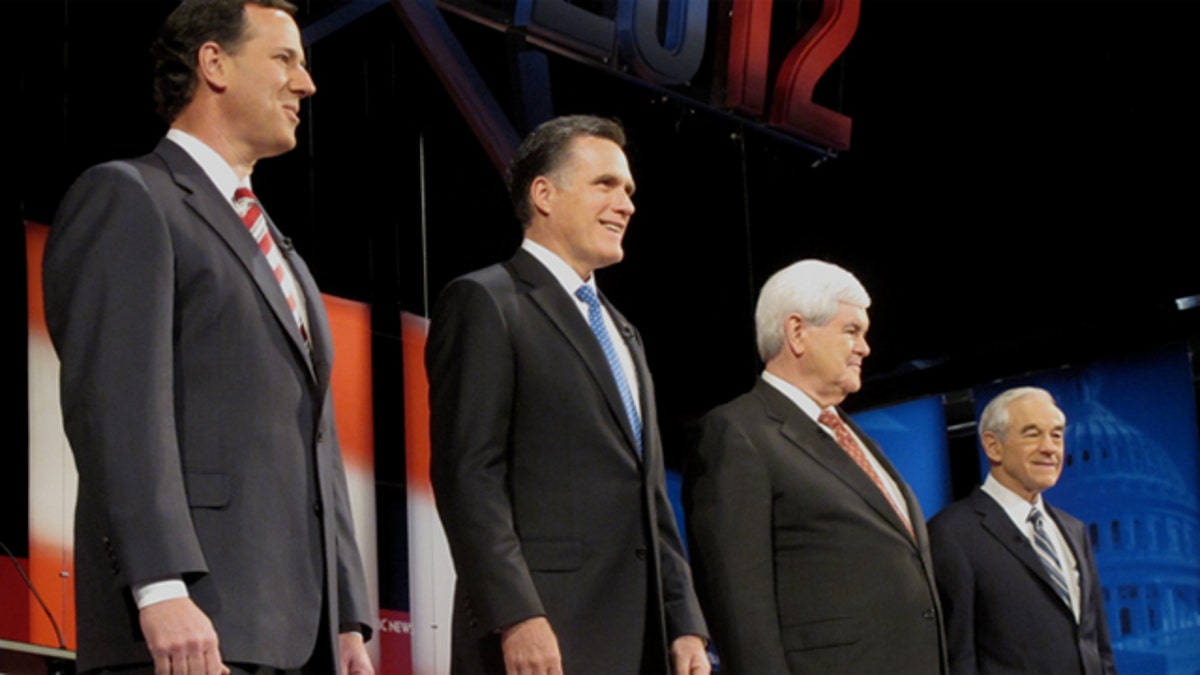
Jan. 23, 2012: Rick Santorum, Mitt Romney, Newt Gingrich and Ron Paul take the stage in Florida for the latest Republican presidential debate. (Fox News)
TAMPA, Fla. – Florida is easily the largest, most important and diverse state to vote in the Republican primaries so far.
It's the fourth largest state in the country and winning there is an absolute must if the eventual Republican nominee is to win the White House. Its voters include white Evangelicals, blue collar workers, lots of retired military and seniors, "refugees" from the colder state of the Northeast and Midwest, and a generous dose of minorities.
As for the candidates, each had an overriding priority in the debate Monday evening.
Newt Gingrich is riding the "Big Mo." He wanted to reassure voters that he is the "big picture conservative" who can best engage President Obama on key economic and foreign policy issues.
Mitt Romney's chief goal was to slow Gingrich's surging momentum and poll numbers. He also wanted to refocus the debate to his strength as a steady and credible conservative who has the business experience necessary to fix America's broken economy.
Rick Santorum needed to get back in the game, and quickly, and wanted to contrast his "consistently conservative" voting record with his perceived shortcomings of his opponents.
Congressman Ron Paul has a pure libertarian message and looked for every opportunity to convey it. He cannot be the Republican nominee, but is the one most likely to go all the way to the convention in August while accumulating lots of delegates along the way.
The focus of the first part of the debate was the tough exchanges between Gingrich and Romney. Romney was consistent in attacking Gingrich for lobbying for Freddie Mac, for his chaotic leadership style in running the House as Speaker, and for ethics violations of House rules.
Gingrich fended off the charges, but was on the defensive for the first quarter of the evening. Romney's strategy was to paint Gingrich as a "high risk" nominee whose campaign could very well implode in a race against President Obama..
On foreign policy, Gingrich, Romney and Santorum criticized the Obama administration for its proposed defense cuts, negotiating with the Taliban in Afghanistan and for failing to deal with the threat posed by Iran.
As in past encounters, Ron Paul strongly dissented and spoke out for a reduced military presence and a non interventionist policy around the world.
Gingrich spent most of his time focusing on his "big ideas" strategy, hard money, flat tax, Medicare reform. He claimed these reforms will bring fundamental change to Washington. He made a clear decision to stay "positive" and refrained from attacks on the other candidates.
Gingrich's strongest answer might have been reciting the litany of his conservative activities including campaigning for Barry Goldwater and Ronald Reagan, founding groups like the Conservative Opportunity society and GOPAC, and working for ideas such as supply side economics and military strength.
In addition to scoring against Gingrich, Romney spoke of his plans to get the economy growing again through tax reform and homeowner housing assistance. He stressed his business background on several occasions, and he seemed more confident and better prepared for the predictable question about releasing his income taxes.
Santorum turned in a strong performance and counted on winning voters turned off by the Romney-Gingrich exchanges. However, he could have done more to push the "consistent conservative" theme by contrasting his views with those of his opponents.
Ron Paul spoke eloquently in favor of liberty and hard money and in opposition to the Wall Street bailout. He has a strong committed base, but his foreign policy views will limit his vote total beyond that.
The debate showcased the talents of each candidate and all performed well and demonstrated a strong command of the issues. There were tough exchanges, as would be expected when each candidate seeks to set himself apart from the field.
But the core argument each of the candidates made was this: Our weak recovery, huge deficits, and lack of jobs and economic growth are due to Obama's policies in favor of big government and high taxes. Cutting back government and taxes and empowering individuals will create far more jobs and increase economic growth and opportunity.
If the focus of the fall election is on Obama's economic performance v Republican pledges, one of these candidates will be the next president.
Frank Donatelli was White House Political Director for President Ronald Reagan and Deputy Chair of the RNC in 2008. He is currently Chairman of GOPAC, the organization that elects and educates the next generation of Republican leaders.
He can be reached at:
Frank Donatelli Facebook: https://www.facebook.com/frank.donatelli
FJD Twitter: @FrankDonatelli
or
GOPAC Website: www.gopac.org
GOPAC Facebook: https://www.facebook.com/pages/GOPAC/25255876194
GOPAC Twitter: @GOPAC








































